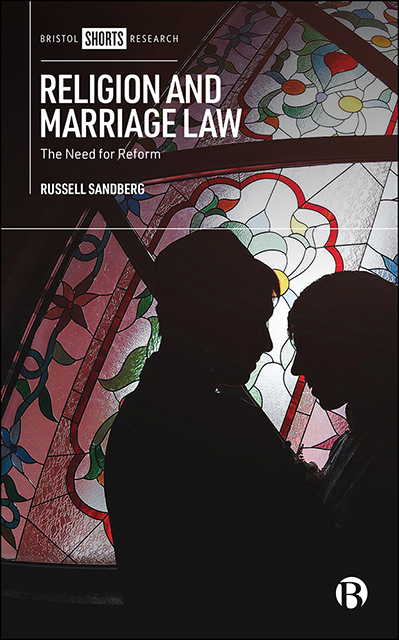One - Introduction: Marital Problems
Published online by Cambridge University Press: 18 April 2023
Summary
The need for reform
This book argues that the law relating to marriage and the regulation of adult intimate relationships in England and Wales is in desperate need of reform. The number of marriages is falling. Office for National Statistics (ONS) data shows that the marriage rate by 2017 (the number of marriages per 1,000 unmarried men and women aged 16 years and over) has decreased, by 75% for men and by 69% for women since 1972, to be the lowest on record (since 1862) and the number of marriages of opposite-sex couples has decreased by 45%. This decline is particularly pronounced in relation to religious marriages. While in 1900 religious ceremonies accounted for 85% of all marriages, and by the late 1970s were 49% of all marriages, by 2017 only 22% of all marriages were religious ceremonies, the lowest percentage on record, with civil marriages having outnumbered religious marriages every year since 1992.
By contrast, the number of cohabiting couples has risen sharply. ONS data shows that the proportion of non-married women aged 18 to 49 who were cohabiting increased from one in ten in 1979 to over a third in 2011. Of those living in a couple, 21.9% were now cohabiting, and among those aged 16 to 29 years this figure rose to 69.2%. Moreover, the ‘common law marriage myth’ remains prevalent, with a British Social Attitudes Survey conducted in 2018 showing that almost half those surveyed (46%) explicitly agreed with the incorrect statement that ‘couples who live together for a period of time have a common law marriage which gives them the same rights as married couples’. Moreover, this figure rose to 55% in relation to households with children.
Marriage law in England and Wales has failed to adapt to this changing social reality. Not only does it single out marriage and civil partnerships for protection, providing virtually no rights for cohabitating couples, but the law of opposite-sex marriage is also based on a distinction between marriages according to the rites of the Church of England (which in this context includes the Church in Wales) and all other marriages.
The law regulating marriage is a historical relic which reflects a bygone age of a Judaeo-Christian society.
- Type
- Chapter
- Information
- Religion and Marriage LawThe Need for Reform, pp. 1 - 6Publisher: Bristol University PressPrint publication year: 2021



